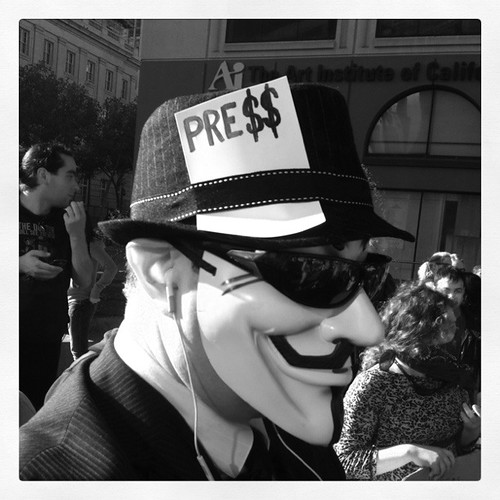 |
| (Photo by Steve Rhodes, via Flckr.) |
A protest at a San Francisco BART station on Thursday outlined the continually evolving struggle to define what makes a journalist and, even worse, the government's role in that definition.
I've blogged here recently about the continuing series of protests against BART after District police shot and killed a man who was reportedly threatening them with a knife and the (in my opinion unconscionable) decision to cut cellular phone service in the stations in order to curtail protests. Another protest on Thursday brought the issue of defining journalists to the forefront.
Instructor Justin Beck, a former San Francisco Chronicle writer and avid Twitterer who taught me last spring in Journalism 226, decided it would be a great teaching experience to take his San Francisco State University online journalism students to the protests as an exercise in live blogging/tweeting an ongoing news event. Things got hectic when, according to the students' Twitter timeline, officers dispersing the crowd began to question the student journalists' lack of professional credentials.
At least one student, Brad Wilson, reported he was handcuffed and detained after being stuck in a throng of protestors that were locked in the BART station by police.
The SFSU student newspaper reported that seven students were detained, the longest for more than two hours. Other media stated that more than 20 people were detained or arrested. Wilson told me via Twitter that he was not cited after Beck stood up for him and the other students.
While the police may claim the students, and other media who were also cited at the event, were exacerbating the protests, the issue about the credentials is a key one. Who should be deciding who are and who aren't journalists? BART police think they are the ones who should decide, it seems.
First, let's address the issue of whether "student journalists" are, in fact, "journalists." To me, it's no question that student journalists have the same rights as professional journalists. In fact, a groundbreaking case on whether police have the rights to search newsrooms is based on a case involving a school paper. In Zurcher vs. Stanford Daily (436 U.S. 547 (1978)), the US Supreme Court ruled that -- at the time -- police may search a newsroom seeking evidence of crimes covered by a media outlet. So outraged was the press and the public, that Congress passed the Privacy Act of 1980, which greatly limits the circumstances in which a newsroom can be searched. Therefore, case law has established that "student journalists" are just plain "journalists."
So to the larger issue; who defines what makes a journalist? Many cities have tried. Lake Oswego, Ore., tried to define a journalist as someone who works for an established media outlet, in an apparent attempt to filter out bloggers from covering certain meetings. In discussing a shield law for journalists a couple years back, senators attempted to limit the "journalist" tag to professionally affiliated journalists.
These definitions simply do not fit the realities of today's journalism. These days, one is more likely to find out local news via a blog, such as SFist or Patch than they would the big city paper. These smaller outlets rarely have much full-time staff and depend on volunteer or freelance contributors for their content.
Many scholarly papers have debated this issue. A growing consensus is going to a definition based on function (i.e., what are these people doing?) instead of a one based on status (who do these people work for?).
Debate over a federal shield law brought the issue front and center, according to an article at Mashable:
According to David Ardia, the director of the Citizen Media Law Project at Harvard Law School, “A functional definition is the way to define journalism. We don’t want to create a definition or guidelines that work only with the current journalistic model. The best definition looks at the activities. Were they conducted with the purpose of providing information to the public? That’s the core and puts the public at the center.”
Were these students seeking to provide information to the public? Damn straight they were. In fact, they were learning how to do so properly. So, to paraphrase The Treasure of the Sierra Madre, "Press passes? We don't need no stinkin' press passes."
At least the students had a sense of humor about being detained:


2 comments:
Really well written article man. I enjoyed reading it.
Excellent analysis. Thank You.
Post a Comment